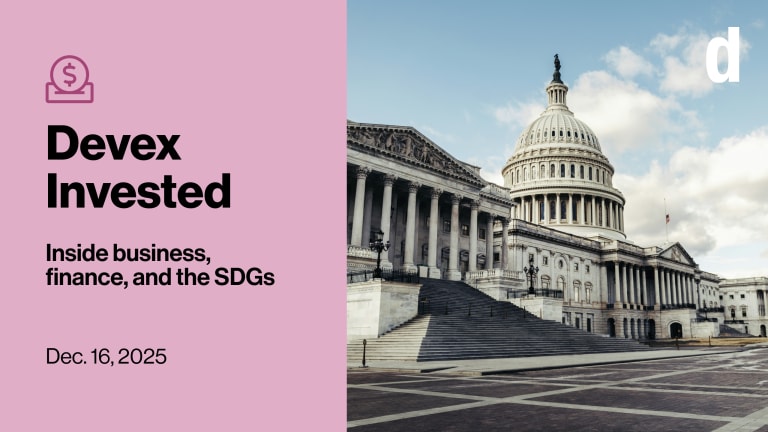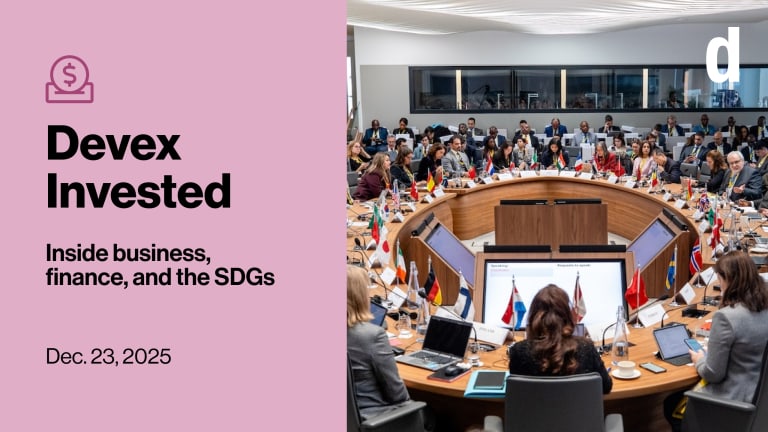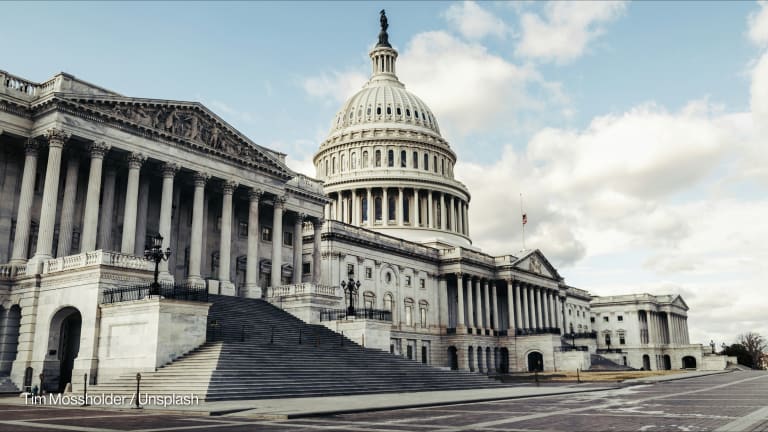How US DFC's domestic lending program in response to COVID-19 works
When announced, the U.S. International Development Finance Corporation's new authority to provide domestic loans under the Defense Production Act raised many questions. Here's how the process works.
WASHINGTON — The U.S. International Development Finance Corporation last week announced it would provide a loan to ApiJect Systems Corp. — its first domestic loan through its Defense Production Act authority and the first example of the new process the agency has set up to provide domestic lending in response to the COVID-19 crisis. The $590 million loan to ApiJect will fund the company’s development of a new factory in North Carolina where it would produce prefilled injectors or syringes that could deliver COVID-19 vaccines, according to DFC. The technology has not yet been approved by the Food and Drug Administration for this use. On Wednesday DFC announced its second loan approved under DPA — up to $1.1 billion to Ginkgo Bioworks to produce raw materials, including mRNA enzymes, that can be used for vaccine development. “The DPA program mirrors largely but is not identical to our normal loan-making process,” a senior DFC official told Devex, adding that the agency’s institutional knowledge and capabilities in making loans and doing project finance were among the main reasons it was chosen to run the program. President Donald Trump’s decision to give DFC authority to make domestic loans under the DPA surprised some development experts, who thought the ability to run the program existed in other parts of the government and were also worried about how it would impact the young agency. While the ApiJect deal is the first to be officially approved, DFC’s announcement of a letter of intent with the Eastman Kodak Company in July — the first deal it discussed as part of the DPA authorization — resulted in investigations by Congress and the Securities and Exchange Commission, and it was put on hold. This raised a number of questions about how deals under the new program would work and increased concerns about what it would mean for DFC’s reputation and focus on its international work, development experts told Devex. DFC has brought on a separate team to run the DPA program and has hired about 11 people on short-term two-year contracts, through a special coronavirus-related hiring authority, for the program, which is “walled off” from the international program, the senior DFC official said. The program is funded through the DPA, which means that the loans come from the Department of Defense rather than DFC’s funds. The process Companies seeking financing can apply through an online portal that was created specifically for the DPA program. Once it is received, an application undergoes a preliminary review by the DPA team to see if it is creditworthy and meets requirements of the DPA and the executive order authorizing DFC to do the loans. The executive order authorizes the DFC CEO, in consultation with several Cabinet members, to use the DPA authority to provide loans “for the domestic production of strategic resources needed to respond to the COVID-19 outbreak, or to strengthen any relevant domestic supply chains.” If an application passes that initial test, then it moves to a prescreening — a meeting currently held each Friday involving the Department of Health and Human Services, DOD, the Office of Trade and Manufacturing Policy at the White House, and others — where potential deals are discussed and either moved forward or rejected. After the prescreening, a potential deal moves on to the screening process, which uses a template similar to that on the international side to look at the financials and risks of the deal. Once through that process, it goes back to get approval from the interagency group. The loan origination team will give a more detailed explanation of the transaction and get feedback from subject matter experts. And if the interagency group approves a deal, then the DFC team proceeds with a full due diligence and underwriting process, sharing information with DOD and engaging with experts on any questions, the official said. A deal is then presented to the credit committee, which is separate from the credit committee on the international side, though it includes mostly DFC staff members along with one DOD representative. Once through the committee, the next step is for the CEO to approve the deal. There is no board approval for the domestic deals because DFC CEO Adam Boehler has authority under the executive order to approve them. Once approved, commitment letters are drafted, financial agreements are finalized, and any additional due diligence or environmental issues and details about off-take contracts are reviewed. Now approved, the ApiJect deal is currently in this transaction finalization phase, the senior DFC official said. Unlike the international process, there is no Impact Quotient framework to measure a project’s development impact, but some impact, including production and jobs, is measured in the domestic deals, the official said. ApiJect Once finalized, DFC will provide 75% of the financing for the new ApiJect facility in North Carolina, which is projected to deliver up to 3 billion vaccine doses a year and could handle 15 different drugs, vaccines, or therapeutics at the same time, according to DFC. The remaining 25% of funding will come from Jefferies Financial Group Inc., a U.S. investment bank, according to DFC. ApiJect has also already received about $150 million from HHS and DOD through previous contracts. While the program would allow DFC to provide 100% of the financing for an individual deal through the DPA authority, the agency established a policy aiming not to finance more than 80%, the senior DFC official said. Similar to the international side, the DPA deals need to prove that they cannot get credit elsewhere, the official said. In this case, Jefferies Financial Group, which was involved in raising capital, had tried to raise additional equity or traditional debt funding and has “not been successful to the scale needed” even after the HHS and DOD funding, the senior DFC official said. The loan also has additional requirements and will have key milestones if it is to receive funding. And if it does not meet the terms, then the disbursements would stop and the loan would be technically in default, the senior DFC official said. In this case, one of the conditions on the loan is that the equipment testing on leased factory lines, which is being funded through previous government allocations, be completed. The product would be “proven before disbursements happen,” the senior DFC official said, adding that everything is on track for ApiJect to get the necessary approvals, based on briefings DFC has had. The DPA program has a “mature pipeline” and more announcements are expected in the coming weeks and months, the senior DFC official said. Nov. 25, 2020: This article has been updated to include DFC’s announcement Wednesday of its second loan approved under the DPA program.
WASHINGTON — The U.S. International Development Finance Corporation last week announced it would provide a loan to ApiJect Systems Corp. — its first domestic loan through its Defense Production Act authority and the first example of the new process the agency has set up to provide domestic lending in response to the COVID-19 crisis.
The $590 million loan to ApiJect will fund the company’s development of a new factory in North Carolina where it would produce prefilled injectors or syringes that could deliver COVID-19 vaccines, according to DFC. The technology has not yet been approved by the Food and Drug Administration for this use. On Wednesday DFC announced its second loan approved under DPA — up to $1.1 billion to Ginkgo Bioworks to produce raw materials, including mRNA enzymes, that can be used for vaccine development.
“The DPA program mirrors largely but is not identical to our normal loan-making process,” a senior DFC official told Devex, adding that the agency’s institutional knowledge and capabilities in making loans and doing project finance were among the main reasons it was chosen to run the program.
This story is forDevex Promembers
Unlock this story now with a 15-day free trial of Devex Pro.
With a Devex Pro subscription you'll get access to deeper analysis and exclusive insights from our reporters and analysts.
Start my free trialRequest a group subscription Printing articles to share with others is a breach of our terms and conditions and copyright policy. Please use the sharing options on the left side of the article. Devex Pro members may share up to 10 articles per month using the Pro share tool ( ).
Adva Saldinger is a Senior Reporter at Devex where she covers development finance, as well as U.S. foreign aid policy. Adva explores the role the private sector and private capital play in development and authors the weekly Devex Invested newsletter bringing the latest news on the role of business and finance in addressing global challenges. A journalist with more than 10 years of experience, she has worked at several newspapers in the U.S. and lived in both Ghana and South Africa.








